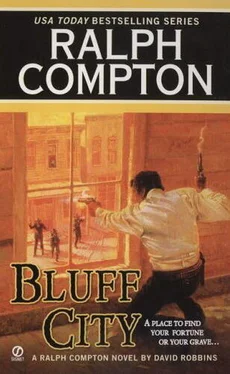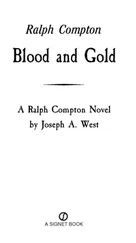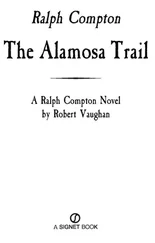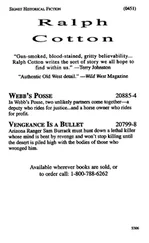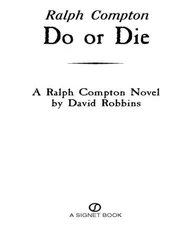Melanie tilted her head and regarded him as a person might regard a polka-dot horse. “You are amazing. Do you know that? Most men take a week or more to muster their courage, but you kick in the barn door and barge on in. I don’t know whether to be flattered or worried.”
“Ma’am?”
“There you are, doing it again.” Melanie moved toward her desk, but stopped and glanced back. “I can’t make up my mind whether you are exactly as you appear to be or a wolf in sheep’s clothing. But I will go to supper with you if for no other reason than to figure you out.”
“Thank you, ma’—” Clay caught himself. “Thank you, Melanie. I assure you my intentions are honorable.”
The newspaper did not keep regular hours. The day started at seven sharp each morning and lasted for as long as was needed to get that day’s edition out on the street. Each edition usually ran to several pages, at least one page of which was devoted to advertising. Subscriptions were delivered by wagon. Street urchins sold the bulk of the copies from assigned street corners.
It was past eight that night when Jerome Stanley came up to Clay Adams and clapped him on the back. “Congratulations. You have survived your first day. Head on home if you like.”
“Did I do all right?”
“Fine, my boy. Absolutely fine. You were polite, and I can read your handwriting. Now get yourself some rest. Tomorrow is Friday, and Friday is a busy day for us because a lot of businesses only advertise in the weekend edition.”
Clay took his derby from the hat rack and turned to Melanie’s desk. Her chair was empty.
“She left a while ago,” Stanley mentioned. “Something about needing her hair done up.”
“Oh.” Clay put on his derby and walked out. The street was clogged with a press of humanity. Townsmen in a variety of store-bought garb. Grimy miners in dirty overalls. Gamblers in frock coats, frontiersmen in buckskins, ladies in proper or too-tight dresses depending on their matrimonial status and how they earned a living. Clay observed the ebb and flow until a warm hand fell on his arm.
“Are you as hungry as I am?”
“Melanie!” Clay clasped her fingers and beamed. “I thought maybe you had changed your mind.”
“Not on your life.” Melanie hooked her arm in his and guided him into the flow of the human current. “I know the perfect place. They serve a delicious New England plate with corned beef and cabbage.”
“You are from New England?”
“Heavens, no,” Melanie said. “I like exotic dishes. How about you?”
“I’ll eat just about anything.”
They walked a block, and Melanie asked, “So what exactly did you want to ask me about?”
Clay Adams gestured. “About Bluff City. Whatever you think is important.” He paused. “I hear tell that the outlaws hereabouts are as thick as ticks on a hound dog. One bunch has stolen so much money that they’re on their way to becoming famous.”
Melanie nodded. “The Jesse Stark gang.”
Chapter 6
The restaurant not only served New England fare, it was called the New England House. Exceedingly popular, New England food, as it was called, included dishes like corned beef and cabbage, brown bread with a heaping bowl of baked beans, and all kinds of vegetables. Puddings and pies were favorite desserts.
When the majordomo saw Melanie Stanley enter, he fawned over her. He insisted on giving her a table near the window, and then snapped his fingers for a waiter to hurry and wait on them. Even more telling, no sooner were they seated than the owner came out of the kitchen to welcome her and ask how her father was doing and what was new at the newspaper.
When they were alone again, Clay Adams sat back and commented, “You are something of a celebrity, I see.”
“I suppose. It comes from being the only female journalist in these parts. Plus, when you are out on the streets every day gathering information, you get to know a lot of people.”
“Do you like it here?”
“I love my job. I would never think of doing anything else. There is always something new. One day I am investigating things like the cave-in, the next day I might be delving into a shooting or a robbery.”
“Is there much in the way of gunplay in Bluff City?”
Melanie broke a bread stick and took a bite. “There is a lot of crime, period. Boomtowns are always wild and reckless, and Bluff City is one of the wildest. You saw the saloons. There must be twice as many fancy houses. Opium dens thrive in the Chinese section.” She pointed the bread stick at him. “How about you?”
“Pardon?”
“Which vice is your cup of tea?”
“I’m partial to a drink and a game of cards now and then,” Clay admitted, “but that is about it. How about you?”
Melanie laughed. “I guess I deserved that. But I limit my vices to a fondness for sweets and refusing to have a personal life. I spend nearly all my waking hours working.”
“No men friends, then?”
“That is rather personal. But yes, there are a few who find me ravishing,” Melanie said breezily, “and one who thinks I belong on a pedestal. But I thought you were more interested in outlaws and the like.”
“Isn’t everyone?” Clay rejoined. Then he casually said, “Earlier you mentioned something about the Jesse Stark gang. Who are they?”
“The talk of the territory. No one knows how many are in it. Some say fifteen. Some say twenty-five. They strike without warning, take what they want and shoot anyone who interferes. Banks, money shipments, stagecoaches—you name it. Fourteen killings to their credit that we know of.”
“They sound like a tough bunch,” Clay observed.
“The toughest. Places like Bluff City are magnets for the bad ones.” Melanie studied him. “I notice you do not wear a gun.”
“A lot of men don’t.”
“True. But a lot of men do, too, and they are the ones to watch out for. Ruffians and footpads are everywhere.”
“I can take care of myself,” Clay said. “Besides, you seem to get by just fine, and you are a woman.”
“It’s precisely because I am female that the rougher element tends to leave me alone,” Melanie said. “Women are treated with special regard because there are so few of us west of the Mississippi, comparatively speaking.”
The waiter brought their food. Melanie had ordered the corned beef and cabbage, Clay the baked beans and brown bread. As he was dipping a piece of bread into the beans, he asked, “This Jesse Stark. How is it the law hasn’t thrown a noose around his neck yet?”
“Don’t think they haven’t tried,” Melanie answered. “Three of those fourteen dead the gang is credited with were lawmen.”
“Stark is out of Kansas, isn’t he?”
“So they say. His early days are a mystery. He might have been born in Missouri. He might have come from Texas. When he first took to the outlaw life, no one can say. He was small potatoes until Whistler’s Flat.”
“Whistler’s Flat?”
“You haven’t heard of it? The story goes that Jesse Stark and his old gang tried to rob the bank there. Only Stark and Crooked Nose Neville Baine got away, and Baine was shot while riding off.”
“Who is he?” Clay asked while dipping more bread.
“Something of a virtuoso with a pistol. Or he was. No one has seen anything of him since Whistler’s Flat. Rumor has it he’s dead.” Melanie forked some cabbage. “Strange, though.”
“What?”
“That he joined the Stark gang. Baine had a string of shootings to his credit but there was no record of him robbing anyone until the incident in Whistler’s Flat. I read a few accounts about him when I was in St. Louis. A typical wild-and-woolly longhair except for his face. They say he was kicked by a horse once, and his nose was so terribly out of shape he was a fright to look at.” Melanie chewed the cabbage while studying her new acquaintance. “You have a few scars yourself.”
Читать дальше
